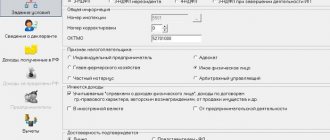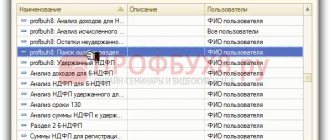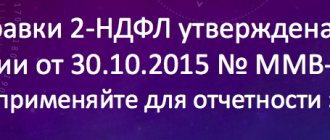Home — Articles
Previously, accountants, having discovered an error due to which personal income tax was not withheld from the employee and, accordingly, was not transferred to the budget, were not particularly worried. After all, they knew that if they corrected the mistake before the tax authorities found it, then they would only have to pay a penalty to the budget. Now there is a possibility that inspectors, having discovered such a corrected error during an on-site inspection, will also be able to fine the organization. And the reason for this is the amendments made to Art. 123 of the Tax Code of the Russian Federation and entered into force in September 2010. Let's see if this is really so.
Responsibility for submitting certificates in Form 2-NDFL with errors
Organizations that are tax agents are required to submit to the tax authority at the place of their registration (clause 2 of Article 230 of the Tax Code of the Russian Federation) a certificate in form 2-NDFL (approved by Order of the Federal Tax Service of Russia dated October 2, 2018 N ММВ-7-11/ [email protected] ) annually no later than March 1 of the year following the expired tax period.
For the submission by a tax agent to the tax authority of documents containing false information, liability is provided in the form of a fine in the amount of 500 rubles. for each submitted document containing false information.
This responsibility also applies when submitting information in Form 2-NDFL with distorted amounts of income, taxes and tax deductions (clause 1 of Article 126.1 of the Tax Code of the Russian Federation, Letter of the Federal Tax Service of Russia dated December 9, 2016 N SA-4-9/ [ email protected] , clause 3 of Letter of the Federal Tax Service of Russia dated 08/09/2016 N GD-4-11/14515).
Thus, if a tax agent does not submit an updated certificate in time to the tax authority in Form 2-NDFL, he may be issued a fine of 500 rubles. for each submitted document containing false information.
However, if unreliable information in the 2-NDFL certificate did not lead to non-calculation or incomplete calculation of the tax, adverse consequences for the budget, or violation of the rights of individuals, the tax agent may apply to the application of mitigating circumstances to him in accordance with clause 1 of Article 112 of the Tax Code of the Russian Federation (Letter of the Federal Tax Service dated 08/09/2016 No. GD-4-11/14515).
GLAVBUKH-INFO
Refund of overpayment through the organizationFor a refund of over-withheld personal income tax, a person can contact the organization that withheld the tax as a tax agent. To do this, he needs to write a statement in any form addressed to the head of the organization. This is stated in paragraph 1 of Article 231 of the Tax Code of the Russian Federation. Tax refunds in cash are not allowed, therefore the application must indicate the bank details of the account to which the tax agent should transfer the excess withheld amount (paragraph 4, paragraph 1, article 231 of the Tax Code of the Russian Federation, letter of the Ministry of Finance of Russia dated February 17, 2011 No. 03- 04-06/9-31). A person can submit an application for a tax refund within three years from the date of its withholding (Clause 7, Article 78 of the Tax Code of the Russian Federation). At the same time, the right to apply for a tax refund does not depend on the existence of labor (civil) relations between a person and an organization on the date of filing the application. For example, a person has the right to submit an application for the return of an excessively withheld amount to an organization after dismissal from it, but before the expiration of the period provided for a tax refund. Similar explanations are contained in the letter of the Ministry of Finance of Russia dated August 25, 2009 No. 03-04-06-01/222.
Sources for returning the overpayment may be upcoming payments for personal income tax, withheld and subject to transfer to the budget: - from the income of the same person who had the overpayment (for example, if the employee from whom the excess amount of personal income tax was withheld continues to work in the organization); - from the income of other taxpayers in relation to whom the organization is a tax agent. This follows from the provisions of paragraph 3 of paragraph 1 of Article 231 of the Tax Code of the Russian Federation. The tax rates at which personal income tax was withheld, sent by the organization to return the overpayment, do not matter. For example, a tax calculated at a rate of 13 percent can be returned from personal income tax amounts calculated at rates of 9, 13, 30 or 35 percent. At the same time, tax agents are required to keep separate records of income (personal income tax amounts), for which different tax rates are applied (clause 3 of Article 226 of the Tax Code of the Russian Federation). Refund period The organization must transfer the repaid amount of the overpayment to the person’s bank account within three months from the date of receipt of his application for refund. If, after this period, the organization does not return the overpayment (in whole or in part) to the taxpayer, then it will have to charge interest on the amount of unrefunded tax for each day of delay. Interest is accrued at the refinancing rates in effect on the days the repayment deadline was missed. This is stated in paragraphs 3–5 of paragraph 1 of Article 231 of the Tax Code of the Russian Federation. The organization itself discovered an overpayment. If an organization-tax agent discovers an overpayment of personal income tax on its own, it is obliged to inform the taxpayer about it within 10 working days (paragraph 2, paragraph 1, article 231, paragraph 6, article 6.1 of the Tax Code of the Russian Federation). The Tax Code of the Russian Federation does not provide for the form and method of reporting the presence of an overpayment of personal income tax. Therefore, the tax agent has the right to send a message to the taxpayer in any form. Such clarifications are contained in the letter of the Ministry of Finance of Russia dated May 16, 2011 No. 03-04-06/6-112. Situation: can an organization independently return to an employee the amount of personal income tax withheld at a rate of 30 percent. During the year, the employee became a tax resident. No, he cannot.
In the situation under consideration, the return of excessively withheld personal income tax is made by the tax inspectorate at the end of the tax period (clause 1.1 of Article 231 of the Tax Code of the Russian Federation, letters of the Ministry of Finance of Russia dated March 31, 2011 No. 03-04-05/6-204 and dated March 21, 2011 No. 03-04-06/6-48). However, an organization can offset (in whole or in part) the amount of personal income tax withheld at a rate of 30 percent against personal income tax, which must be withheld at a rate of 13 percent. If an employee continuously worked in an organization for more than 183 days a year (for example, from January 1 to July 3), then he acquires the status of a tax resident (clause 2 of Article 207 of the Tax Code of the Russian Federation). Starting from the month in which the employee’s documented period of stay in Russia exceeded 183 days, the organization’s accountant must withhold personal income tax from his income at a rate of 13 percent (clause 1 of Article 224 of the Tax Code of the Russian Federation). Personal income tax is calculated monthly on an accrual basis from the beginning of the year with the offset of previously withheld tax amounts (clause 3 of Article 226 of the Tax Code of the Russian Federation). Consequently, personal income tax amounts withheld at a rate of 30 percent before an employee acquires tax resident status are subject to offset when withholding personal income tax after the employee has become a resident. The validity of this conclusion is confirmed by letters of the Ministry of Finance of Russia dated September 22, 2011 No. 03-04-06/6-233, dated September 21, 2011 No. 03-04-06/6-226, dated September 19, 2011 No. 03- 04-06/6-224, dated August 12, 2011 No. 03-04-08/4-146 and Federal Tax Service of Russia dated September 21, 2011 No. ED-4-3/15413, dated June 9, 2011 No. ED -4-3/9150. If at the end of the year the amount of personal income tax, excessively withheld at a rate of 30 percent, is greater than the amount of tax withheld at a rate of 13 percent, the employee will be able to return the difference through the tax office (clause 1.1 of Article 231 of the Tax Code of the Russian Federation). To do this, at the end of the tax period, he must submit an income declaration in form 3-NDFL to the tax office at his place of registration. At the employee’s request, the organization must provide him with the documents necessary to confirm income, as well as personal income tax amounts accrued and paid to the budget. For example, form 2-NDFL and a certificate from the place of work, compiled on the basis of time sheets. The employee can confirm the duration of his stay in Russia with a copy of his passport with border crossing marks from the border service. It is not necessary to submit to the tax office a certificate confirming the employee’s status (they are issued by the Interregional Inspectorate of the Federal Tax Service of Russia for centralized data processing) to return the excessively withheld amount of personal income tax. Such clarifications are contained in the letter of the Federal Tax Service of Russia dated May 25, 2011 No. AS-3-3/1855.
An example of crediting over-withheld personal income tax to an employee who acquired tax resident status during the year.
The recalculation of personal income tax for the past months of the tax period and the crediting of the excessively withheld amount to the employee of the tax agent organization is carried out independently by Citizen of Moldova A.S. Kondratiev has been working under an employment contract at ZAO Alfa since May 4, 2012. He arrived in Russia on December 30, 2011. Until this moment, Kondratiev had not been to Russia. The organization pays Kondratiev a monthly salary in the amount of 25,000 rubles. For May–June 2012, his income amounted to 50,000 rubles. (RUB 25,000 × 2 months). At the time of receipt of income (for May and June 2012), Kondratiev was in Russia for less than 183 days. Therefore, during this period, personal income tax was withheld from him and transferred to the budget at a rate of 30 percent in the amount of 15,000 rubles. (RUB 50,000 × 30%). As of July 1, Kondratiev’s stay in Russia for 12 consecutive months was 183 days (from December 30, 2011 to July 1, 2012), that is, he became a resident. In this regard, the accountant recalculated the previously withheld tax at a rate of 13 percent. Kondratiev does not have the right to standard tax deductions. The amount of personal income tax on Kondratiev’s income at a rate of 13 percent for May–June 2012 amounted to 6,500 rubles. (RUB 50,000 × 13%). In the tax accounting register for personal income tax, the accountant reversed the tax accrual at a rate of 30 percent and accrued personal income tax at a rate of 13 percent. The amount of excess tax withheld was 8,500 rubles. (RUB 15,000 – RUB 6,500). In July 2012, Kondratyev wrote an application for offset of the excessively withheld amount of personal income tax. The organization's accountant decided to carry out the accounting on his own. Based on the results of the recalculation, he applied to the tax office with an application to offset the overpayment of personal income tax at a rate of 30 percent against payment of personal income tax at a rate of 13 percent. The inspectorate's consent to the offset was obtained, therefore, until the overpayment of tax was repaid, the organization's accountant did not transfer to the budget the amounts of personal income tax withheld from Kondratiev's income. To reflect in the accounting of operations for withholding personal income tax, the organization’s accountant opened subaccounts for account 68 “Calculations for taxes and fees”: - “Calculations for personal income tax at a rate of 30%”; — “Calculations for personal income tax at a rate of 13%.” Monthly in May and June: Debit 26 Credit 70 - 25,000 rub. – Kondratiev’s salary was accrued; Debit 70 Credit 68 subaccount “Calculations for personal income tax at a rate of 30%” – 7500 rubles. – personal income tax is withheld at a rate of 30 percent; Debit 70 Credit 50 – 17,500 rub. (RUB 25,000 – RUB 7,500) – Kondratyev’s salary was issued; Debit 68 subaccount “Calculations for personal income tax at a rate of 30%” Credit 51 – 7500 rub. – transferred to the personal income tax budget at a rate of 30 percent. In July: Debit 70 Credit 68 subaccount “Calculations for personal income tax at a rate of 30%” - 15,000 rubles. (RUB 7,500 × 2 months) – personal income tax, previously withheld from Kondratiev’s income at a rate of 30 percent, was reversed; Debit 70 Credit 68 subaccount “Calculations for personal income tax at a rate of 13%” – 6500 rubles. (RUB 25,000 × 2 months × 13%) – personal income tax is reflected, subject to deduction from Kondratiev’s salary for May–June at a rate of 13 percent; Debit 68 subaccount “Calculations for personal income tax at a rate of 13%” Credit 68 subaccount “Calculations for personal income tax at a rate of 30%” - 15,000 rubles. – reflected the offset of the overpayment of personal income tax at a rate of 30 percent against the payment of personal income tax at a rate of 13 percent (with the permission of the tax inspectorate); Debit 26 Credit 70 – 25,000 rub. – Kondratiev’s salary for July was accrued; Debit 70 Credit 68 subaccount “Calculations for personal income tax at a rate of 13%” - 3250 rubles. – a partial offset of personal income tax, excessively withheld at a rate of 30 percent, is reflected against personal income tax, subject to withholding at a rate of 13 percent, for July; Debit 70 Credit 50 – 25,000 rub. – Kondratiev’s salary for July was issued. In August: Debit 26 Credit 70 - 25,000 rubles. – Kondratiev’s salary for August was accrued; Debit 70 Credit 68 subaccount “Calculations for personal income tax at a rate of 13%” - 3250 rubles. – a partial offset of personal income tax, excessively withheld at a rate of 30 percent, is reflected against personal income tax, subject to withholding at a rate of 13 percent, for August; Debit 70 Credit 50 – 25,000 rub. – Kondratiev’s salary for August was issued. In September: Debit 26 Credit 70 - 25,000 rubles. – Kondratiev’s salary for September was accrued; Debit 70 Credit 68 subaccount “Calculations for personal income tax at a rate of 13%” – 2000 rubles. (15,000 rubles – 6,500 rubles – 3,250 rubles – 3,250 rubles) – reflects a partial offset of personal income tax, excessively withheld at a rate of 30 percent, against personal income tax, subject to withholding at a rate of 13 percent, for September; Debit 70 Credit 68 subaccount “Calculations for personal income tax at a rate of 13%” – 1250 rubles. (RUB 25,000 × 13% – RUB 2,000) – personal income tax was withheld from Kondratiev’s salary for September; Debit 70 Credit 50 – 23,750 rub. – Kondratiev’s salary for September was issued; Debit 68 subaccount “Calculations for personal income tax at a rate of 13%” Credit 51 – 1250 rubles. – transferred to the personal income tax budget from Kondratiev’s salary for September.
Refund of overpayment through inspection
Upcoming personal income tax payments may not be enough to return the overly withheld tax amount within the three-month period established by paragraph 3 of paragraph 1 of Article 231 of the Tax Code of the Russian Federation. In this case, the tax agent should apply for a refund of the missing amount to the tax office at the place of his registration. An application for the return of an excessively transferred amount of personal income tax must be submitted to the inspectorate within 10 working days from the date of receipt of the application from the taxpayer (paragraph 6, paragraph 1, article 231, paragraph 6, article 6.1 of the Tax Code of the Russian Federation). Therefore, the tax agent must make a decision on the method of returning the overpayment (at the expense of upcoming payments or at the expense of funds returned by the inspection) immediately after receiving the taxpayer’s application (letter of the Ministry of Finance of Russia dated May 16, 2011 No. 03-04-06/6-112). The tax inspectorate will return the overpayment of personal income tax to the tax agent organization in the manner established by Article 78 of the Tax Code of the Russian Federation (paragraph 7, clause 1, article 231 of the Tax Code of the Russian Federation). Before the overpayment is credited to the organization's current account, the tax agent has the right to return the excessively withheld amount of personal income tax to the person at his own expense (paragraph 9, clause 1, article 231 of the Tax Code of the Russian Federation). It should be noted that if an organization mistakenly transferred personal income tax to the budget in a larger amount than was withheld, then this amount cannot be offset against upcoming tax payments. According to the tax service, this amount is not an overpaid tax, since it was not withheld from the income of employees, but went to the budget at the expense of the organization - the tax agent. Tax agents do not have the right to pay personal income tax at their own expense (clause 9 of article 226 of the Tax Code of the Russian Federation). Therefore, in such a situation, it is only possible to return the overpaid amount as a payment erroneously transferred to the budget. Similar clarifications are contained in the letter of the Federal Tax Service of Russia dated July 4, 2011 No. ED-4-3/10764.
If it is decided to return the overpayment using funds returned from the budget, along with the application to the tax office you must submit: - an extract from the tax register for personal income tax on the employee’s income; — documents confirming the fact of excessive withholding and transfer of personal income tax. The list of such documents is not established by law. However, in practice, the inspectorate may require from the tax agent: - a copy of the employee’s application (indicating the reason for the overpayment, the date of its occurrence and the amount);
— a copy of the certificate in form 2-NDFL as of the date of application for a refund;
— data on settlements with the budget for personal income tax starting from the year for which the tax was recalculated. As a document confirming the data on settlements with the budget for personal income tax, you can submit an extract from account 68 subaccount “Settlements with the budget for personal income tax.” The amount of accruals on the credit of this account must be reversed by the amount of the tax overpayment (so that the amount of the overpayment is visible). Similar clarifications are contained in the letter of the Ministry of Finance of Russia dated August 9, 2012 No. 03-04-06/6-229.
An example of returning excessively withheld personal income tax to an employee at a rate of 13 percent.
The overpayment is returned at the expense of upcoming personal income tax payments, subject to withholding and transfer to the budget from employee income. In August 2012, an employee of Torgovaya LLC A.S. Kondratiev was on a business trip. Upon his return, he submitted an advance report in which he reflected the costs of travel to the place of business trip and back in the amount of 10,000 rubles. He did not have tickets confirming travel expenses. Despite this, travel expenses were compensated to Kondratiev based on his application and the order of the manager. The accountant included the reimbursable expenses in the personal income tax base in August. The amount of personal income tax on compensation for travel expenses was 1,300 rubles. Kondratyev’s monthly income is 8,000 rubles. Kondratiev has no children. For the period January–August, standard deductions were not provided to the employee. Data on accrued income and withheld tax are given in the table. Period Amount of taxable income Amount of personal income tax to be withheld January 8,000 rub. 1040 rub. (8,000 rubles × 13%) January–February 16,000 rubles. 2080 rub. (RUB 16,000 × 13%) January–March RUB 24,000 3120 rub. (RUB 24,000 × 13%) January–April RUB 32,000 4160 rub. (RUB 32,000 × 13%) January–May RUB 40,000 5200 rub. (40,000 rub. × 13%) January–June 48,000 rub. 6240 rub. (48,000 rub. × 13%) January–July 56,000 rub. 7280 rub. (RUB 56,000 × 13%) January–August RUB 74,000. (64,000 rub. + 10,000 rub.) 9,620 rub. (RUB 74,000 × 13%) In September 2012, Kondratiev submitted air tickets to the accounting department for travel to and from the business trip. At the same time, he filed an application for the return of excessively withheld personal income tax in the amount of 1,300 rubles. Based on these documents, the Hermes accountant recalculated Kondratiev’s total taxable income for January–August and adjusted (reversed) the amount of personal income tax withheld. The results of the adjustment are presented in the table. Period Amount of taxable income Amount of personal income tax to be withheld Excessive amount of personal income tax withheld January–August RUB 64,000. (74,000 rub. – 10,000 rub.) 8,320 rub. (RUB 64,000 × 13%) RUB 1,300 (9620 rubles – 8320 rubles) The total amount of personal income tax withheld from the salaries of all Hermes employees for September was 130,000 rubles. Of this amount, the Hermes accountant transferred only 128,700 rubles to the budget. The difference is 1300 rubles. was transferred to the bank account specified by Kondratiev in the return application. Operations related to the withholding, recalculation and payment of personal income tax to the budget are reflected in the accounting records of Hermes in the following entries. In August: Debit 70 Credit 68 subaccount “Personal Income Tax Payments” – 1300 rubles. – personal income tax was withheld from compensation for travel expenses not documented by Kondratiev; Debit 68 subaccount “Personal Income Tax Payments” Credit 51 – 1300 rub. – transferred to the personal income tax budget, withheld from Kondratiev’s income. In September: Debit 70 Credit 68 subaccount “Personal Income Tax Payments” – 1300 rubles. – the amount of personal income tax that was excessively withheld from Kondratiev’s income was reversed (in connection with documentary evidence of expenses); Debit 20 Credit 70 – 1,000,000 rub. – salaries of the organization’s employees were accrued for September; Debit 70 Credit 68 subaccount “Personal Income Tax Payments” – 130,000 rubles. (RUB 1,000,000 × 13%) – personal income tax withheld from employee salaries for September; Debit 68 subaccount “Personal Income Tax Payments” Credit 51 – 128,700 rub. (RUB 130,000 – RUB 1,300) – transferred to the personal income tax budget for September; Debit 70 Credit 51 – 1300 rub. – the excessively withheld personal income tax was transferred to Kondratyev. Information on income Based on the results of the tax period (no later than April 1 of the next year), submit to the tax office a certificate in form 2-NDFL on the income received by the employee from the organization (clause 2 of Article 230 of the Tax Code of the Russian Federation). For more information about this, see How to submit a certificate in form 2-NDFL.
Sergey Razgulin, Deputy Director of the Tax Department
and customs tariff policy of the Ministry of Finance of Russia
Glavbukh system
| Next > |
How to avoid liability for submitting false certificates in Form 2-NDFL
A tax agent is exempt from liability if he independently identifies errors and submits updated documents before the moment he learns that the tax authority has discovered that the information is unreliable.
That is, updated documents must be submitted by the tax agent before the tax authority requests explanations regarding the discovery of errors in the certificate in Form 2-NDFL (clause 2 of Article 126.1 of the Tax Code of the Russian Federation, Letter of the Ministry of Finance of Russia dated June 30, 2016 N 03-04-06/38424 , Federal Tax Service of Russia dated July 19, 2016 N BS-4-11/13012).
How to correct errors made when calculating taxes
Let's imagine that you made a mistake in calculating personal income tax for 2010 or 2011, for example, because child deductions were provided incorrectly. It may not even be your fault. For example, the following situations were described to us by our readers (Subclause 4 of clause 1 of Article 218 of the Tax Code of the Russian Federation): - an employee was provided with a deduction for a child studying full-time at the institute, and then it turned out that the child was transferred to the evening department; — the employee was given a double deduction for the child as a single parent, and the employee brought a marriage certificate, from which it follows that she has been married for six months.
Advice If an employee brings documents late, which indicate that he is not entitled to a child deduction, he must be sure to record the date of their receipt. For example, you can draw up an accounting certificate, indicate in it what documents the employee presented, put a date and two signatures - the accountant and the employee. This certificate will be proof that the organization incorrectly calculated and underpaid personal income tax through no fault of its own. And since there is no guilt, then you can try to fight off the fine (Clause 2 of Article 109 of the Tax Code of the Russian Federation).
It is also possible to make a mistake in calculating tax due to incorrect accrual of income to an employee (for example, some income is not taken into account). Any of the listed errors will lead to untimely withholding and transfer of personal income tax to the budget. And you will have to recalculate the tax, because tax amounts not withheld from employees or not fully withheld are collected from these employees by the organization itself until the debt is fully repaid (Clause 2 of Article 231 of the Tax Code of the Russian Federation). An accountant can detect an error both before submitting 2-NDFL certificates to the inspectorate and after that. And conscientious accountants usually correct mistakes themselves. Option 1. The error was found after submitting 2-NDFL certificates for all employees to the inspectorate . In this case, they act as follows: - recalculate the tax; — inform the employee about the mistake made and the amount of personal income tax that must be withheld from him (Clause 2 of Article 231 of the Tax Code of the Russian Federation). After this, the employee is asked to: ( or ) deposit the tax debt in cash at the cash desk; ( or ) withhold the debt from the income paid to him. At the same time, the total amount of personal income tax withheld (tax for the current month + debt) should not exceed 50% of the amount given to the employee in person (Clause 4 of Article 226 of the Tax Code of the Russian Federation); — transfer the withheld tax to the budget; - after the entire personal income tax debt has been repaid, they transfer penalties to the budget and submit to their Federal Tax Service a “refined” (newly compiled) certificate 2-NDFL for a specific employee (Section I of the Recommendations, approved by Order of the Federal Tax Service of Russia dated November 17, 2010 N IMV -7-3/ [email protected] (edited 12/06/2011)). It reflects the correct amounts: income, deductions, calculated (clause 5.3 of the certificate), withheld (clause 5.4 of the certificate) and transferred (clause 5.5 of the certificate) personal income tax. Moreover, all three personal income tax amounts in the certificate are the same. After all, on the date of submission of the certificate, the tax from the employee has already been withheld and transferred to the budget. Option 2. The error was found before the 2-NDFL certificates were submitted to the inspectorate . In such a situation, accountants make a recalculation,, if possible, withhold personal income tax from the income of employees and transfer the debt before submitting the 2-personal income tax certificates to the inspectorate. And the certificates for these employees no longer show debts. In Sect. 5, the amounts of tax calculated, withheld and transferred are indicated as equal. And, trying to avoid a fine, they transfer penalties to the budget.
In what form should the 2-NDFL adjustment be submitted?
The adjusted (updated) certificate 2-NDFL must be submitted in the form that was in force in the tax period for which the corresponding changes are made and this certificate is submitted (clause 5 of the Procedure for submitting information on the income of individuals and the amount of tax on personal income and messages about the impossibility of withholding tax, about the amounts of income from which tax was not withheld, and the amount of unwithheld tax on personal income, approved by Order of the Federal Tax Service of Russia dated October 2, 2018 N ММВ-7-11/ [email protected] ).
For example, if in 2021 you need to submit an adjustment for 2-personal income tax for 2021, then you must submit the corrective certificate in the form that was in force in 2017.
Fine under Art. 123 of the Tax Code of the Russian Federation: how it was and how it became
Let us recall that until September 3, 2010, tax agents were subject to a fine only for non-transfer (incomplete transfer) of tax subject to withholding and payment (Article 123 of the Tax Code of the Russian Federation (as amended, valid until September 3, 2010)). As judicial practice shows, a fine was threatened only if personal income tax was not transferred to the budget before the inspectorate made a decision on the audit (Letter of the Ministry of Finance of Russia dated October 13, 2008 N 03-02-07/2-177; Resolution of the Federal Antimonopoly Service of the Eastern Military District dated May 12, 2008 on the case N A17-6144/2007-05-20; FAS VSO dated January 29, 2009 N A19-3295/08-50-F02-7091/08;). That is, according to the judges, liability for untimely transfer of tax by a tax agent in Art. 123 of the Tax Code of the Russian Federation was not established. As a result, organizations that transferred personal income tax to the budget after the due date got off with only penalties. Of course, the tax authorities did not like this situation. After all, penalties were not particularly motivating for timely payment of personal income tax (as a rule, they are not so large, since they are calculated based on 1/300 of the refinancing rate of the Central Bank (Clause 4 of Article 75 of the Tax Code of the Russian Federation)). And the tax service, together with the Ministry of Finance, initiated amendments to Art. 123 Tax Code of the Russian Federation. As a result, from 09/03/2010 you can face a fine, among other things, for late transfer of personal income tax to the budget (Article 123 of the Tax Code of the Russian Federation). Thus, now those who transferred the personal income tax withheld from employees with a delay of at least 1 business day can be fined 20% of the untimely transferred tax amount by tax authorities. By the way, the Federal Tax Service in the Perm Territory has already reported on its website about an increase in fines collected from tax agents: in 2011 they increased by more than 15% compared to 2010. In addition, the Federal Tax Service reported that tax agents must be fined for each case untimely transfer of tax, despite the payment of the debt before a decision was made based on the results of the audit and the absence of arrears for personal income tax. However, if you untimely transferred personal income tax with a payment deadline of September 3, 2010 , but corrected the error before the decision was made, you will not face a fine. After all, norms that worsen the position of tax agents do not have retroactive effect (Clause 2 of Article 5 of the Tax Code of the Russian Federation; Resolution of the Federal Antimonopoly Service ZSO dated February 16, 2012 in case No. A75-4084/2011). This means that responsibility for the provisions provided for in Art. 123 of the Tax Code of the Russian Federation, offenses committed before the amendments entered into force, but discovered after this point, do not apply. And some regional Federal Tax Service offices explain on their websites that in this case the provisions of Art. 123 of the Tax Code in the old edition, taking into account established judicial practice.
Please note: Explanations from the regional Federal Tax Service on the procedure for holding tax agents accountable under the new version of Art. 123 of the Tax Code of the Russian Federation are posted on the websites: Federal Tax Service for the Perm Territory: https://www.r59.nalog.ru > News > All news > Service events > Publication date 02/21/2012 “The Department reminds tax agents that timely transfer of personal income tax excludes unreasonable expenses for payment of fines" (https://www.r59.nalog.ru/ns/3896662/); Federal Tax Service for the Astrakhan region: https://www.r30.nalog.ru > News > All news > Service events > Publication date 05/19/2011 “On the application of Art. 123 of the Tax Code of the Russian Federation" (https://www.r30.nalog.ru/ns/3808789/); Federal Tax Service in the Khabarovsk Territory: https://www.r27.nalog.ru > News > All news > Service events > Publication date 05/04/2011 “On bringing to tax liability under Art. 123 of the Tax Code of the Russian Federation" (https://www.r27.nalog.ru/help_nalog/nalz/on/3804124/).
What to indicate in the adjustment certificate in form 2-NDFL
An adjustment should be submitted to the Federal Tax Service with all the information, and not just with those in which an error was previously made.
When drawing up a corrective certificate to replace the previously submitted one, the number of the previously submitted initial certificate (the one containing the error) is indicated in the “Certificate Number” field, and the new date is already entered.
In the “Adjustment number” field, the corresponding adjustment number is indicated (clauses 2.5, 2.8 of the Procedure).
An updated certificate must also be submitted to the tax authorities in cases where the employee’s information is incorrect (see, for example, Letter of the Federal Tax Service for Moscow dated March 18, 2011 No. 20-14/3/ [email protected] ).
Only those certificates that have been corrected will be submitted.
Sign of adjustment in certificate 2-NDFL
The adjustment number in the 2-NDFL certificate shows whether the organization submits the initial 2-NDFL certificate or an already corrected (clarified) one to the Federal Tax Service.
Thus, when submitting an initial certificate for a specific individual, “00” is entered in the “Adjustment number” field.
In the “Adjustment number” field, accordingly, the code “01”, “02”, etc. is indicated. depending on the invoice adjustment.
So, if this is the first time an adjusted certificate, then the code “01” is entered (clause 2.8 of section II of the Procedure for filling out form 2-NDFL, approved by Order of the Federal Tax Service of Russia dated October 2, 2018 N ММВ-7-11/ [email protected] ).
If a second corrective certificate is submitted for the same period, then the certificate is assigned a serial number - “02”, and so on, depending on the number of corrections.





